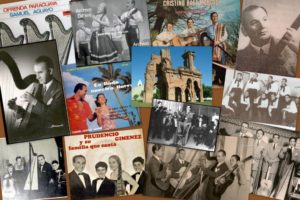The Harpists of Paraguay, part 8
On 8 June 2010, the then President of Paraguay Fernando Lugo Méndez officially proclaimed the harp of Paraguay as “The Symbol of the Musical Culture of Paraguay”. The Jesuits brought the harp from Spain to South America around 1700, and the playing style developed differently in South American countries like Mexico, Venezuela and especially in Paraguay. Around 1950, Paraguay introduced the harp to the West in its perfect form, which caused a true revolution. What a beautiful instrument it had become and so pure in tone. Hundreds of ensembles travelled to Europe, among whom the Trío Los Paraguayos became the most famous. All folk music from Paraguay was played on the harp, and it became an indispensable attribute of this music. Yet, progress was inevitable in Paraguay, and the harp was in danger of being replaced by the electronic keyboard. However, they could not let this happen, and with united efforts, propaganda, education and festivals, the harp was eventually upgraded to the status it achieved with the proclamation of 8 June 2010.
In this part 8, we focus in particular on Prudencio Giménez and his family business of four. And a touch of history because Paraguay has suffered greatly throughout its years. We will also focus on Samuel Aguayo, who, although not a harpist but a singer, spent his whole life serving the folklore of Paraguay and performing diplomatic services. He is probably the most distinguished man in Paraguay, after the dictators, of course. We will also start introducing one of the longer-standing groups. The harpist with the “devil’s hands”; we would say “the man with the golden hands” (sounds friendlier). He was born in the same place where Féliz Pérez Cardozo (Yhaty) was born, who was later renamed Féliz Pérez Cardozo forever. So that is very promising! His name is Cristino Báez Monges and his Conjunto.

Playlist:
1) Santiago H. Roca, polca-instr. ) Prudencio Giménez [018]
(Prudencio Giménez) – Y Su Arpa Maravillosa – Odeón LDS 776
2) Brisa Suave, polca – P. Giménez, Olga Arreguí, Piruchi (Alfredo) and Carlitos
(F.Castro Chamorro-L.Larramendi) – TV-recording
3) El loro paraguayo, rasguido-doble (P. Giménez) – O. Arreguí-Hnos. Benitos-Barrios – Y Su Conjunto Paraguayao – Cientocinco 30.047
4) Ruinas De Humaitá, canción patriótica (P.Giménez-Carlos A.Abente) – Prudencio Giménez – Cientocinco 30.047
5) Triste quedó la casa, canción-paraguaya (P.Giménez – O. Arregui-Hnos. Benitos-Barrios – Acuarela Paraguaya Vol. 3 – Odeón LDF 4312
6) Chilita, canción-paraguaya (L.Rolón de Ramos Giménez-P.Gim) – O. Arregui-Hnos. Benitos-Barrios – Acuarela Paraguaya Vol. 3 – Odeón LDF 4312
7) Ñandu pysa, polca-paraguaya-instr (P. Giménez) – Y Su Conjunto Paraguayao – Cientocinco 30.047
8) Obrerito, kire-é, vocal (J.Asunción Flores S.D.Aranda) – O. Arregui-Hnos. Benitos-Barrios – Acuarela Paraguaya Vol. 3 – Odeón LDF 4312
9) Mi amor lejano, guarania (P. Giménez) – Olga Arreguí, vocal – Y Su Arpa Maravillosa – Odeón LDS 776 (1)
10) Burrerita, canción-paraguaya (Felix Pérez Cardozo-A.Ortiz) Cuarteto vocal ‘MISIONERA’ – Odeón LDS 824
11) Lucerito Alba, canción típica paraguaya (Eladio Martínez) Olga Arreguí y Gamarra-Gómez, vocal ‘MISIONERA’ – Odeón LDS 824
12) Noche del Paraguay, canción-paraguaya (Samuel Aguayo) Olga Arreguí y Gamarra-Gómez, vocal ‘MISIONERA’ – Odeón LDS 824
13) Viejo campanario, kire-í-instr. (Marfil) – Y Su Arpa Maravillosa – Odeón LDS 776
14) China querida, canción típica paraguaya (vocal) – Samuel Aguayo [019] – Ofrenda Paraguaya – Polydor 20331 08
15) A mi Margarita, polca-paraguaya (onbekend) – Ofrenda Paraguaya – Polydor 20331
16) General Stroessner (??) – Samuel Aguayo
17) Tres de Mayo, galopa-instr. (Julián Alarcón) – Cristino Báez Monges, harpa – RCA Camden CAL 3030
18) Felicidades!, polca (Cirilo R. Zayas) – Cristino Báez Monges [020] – Felicidades – Odeón SLDB 1053 (1971)
19) Mi nostalgia, guarania (Digno García) – Cristino Báez Monges – Felicidades – Odeón SLDB 1053 (1971)
20) Cantar del viento, polca-instrumental ((C. Báez Monges) – Felicidades – Odeón SLDB 1053 (1971)








